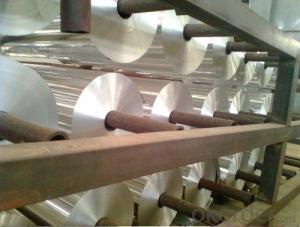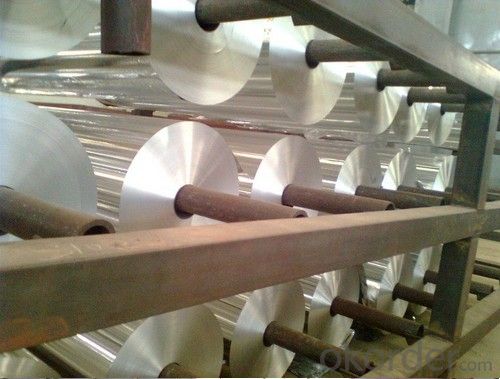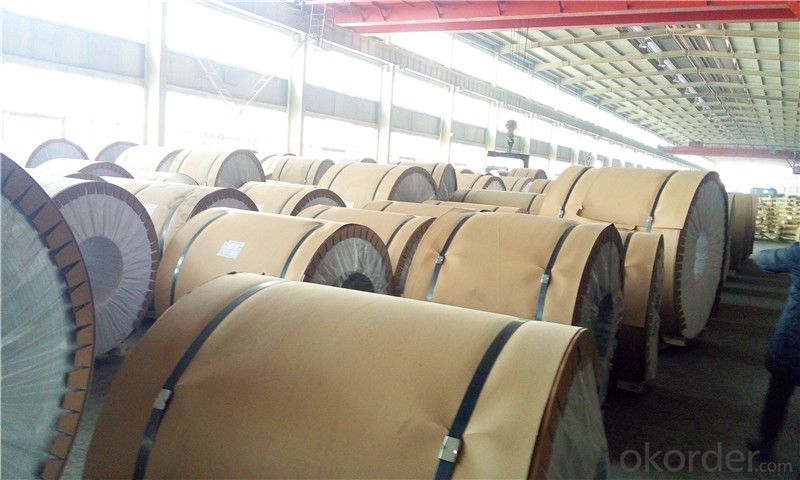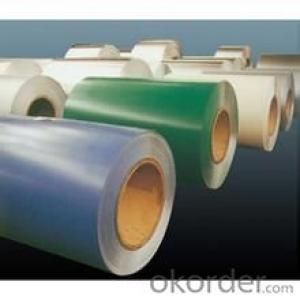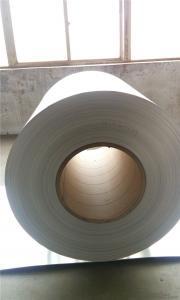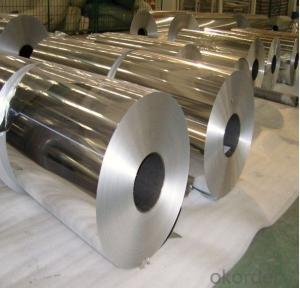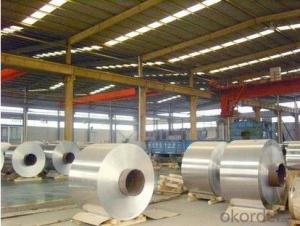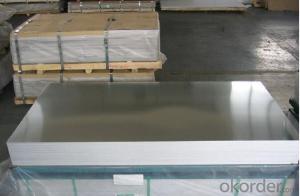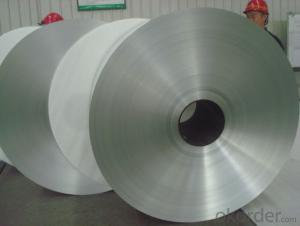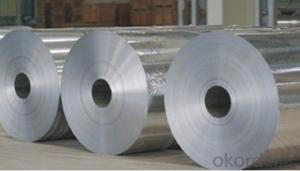ASTM Grade 1100 Aluminum Strips Belt for Solar - Aluminum Coils Prices
- Loading Port:
- Shanghai
- Payment Terms:
- TT OR LC
- Min Order Qty:
- 5 m.t.
- Supply Capability:
- 500 m.t./month
OKorder Service Pledge
OKorder Financial Service
You Might Also Like
Specification
ASTM Grade 1100 Aluminum Strips Belt For Solar
aluminum coil specifications:
1) Alloy :1050, 1060,1100, 3003 3004 3105 3A21 5005 5052 etc
2) Temper: O/H12/H14/H1/H18/H32/H34/H36/H38//H111/H112/H116/H321/T6/T651/T3/T351 etc
3) Thickness: 0.1mm to 6mm
4) Width:20mm to 3300mm
5)Coil weight: 100kgs to 6 tons depends on actual requirement
6)Core material: Aluminum or paper
7)Coil Inner diameter: 75mm, 150mm, 200mm, 300mm, 405mm, 505mm or as required
8) Protective film can be added
item | 3003 Aluminum coil | |
Standard | GB/T3190-2008,GB/T3880-2006,ASTM B209,JIS H4000-2006,etc | |
Material | 1060,1050,1100 3003,3103,3004,3005,3105 5052, 5454,5754 | |
Size | Thickness | 0.5mm-3.5mm |
Width | 800-1500mm | |
Weight/Roll | About 1.5MT/3MT | |
Quality control | Mill Test Certificate is supplied with shipment, Third Part Inspection is acceptable. | |
Surface | Bright, polished, hair line, brush, checkered, embossed, etc | |
Trade terms | Price term | ,FOB, CNF, CIF, etc |
Payment Term | TT,L/C | |
MOQ | 2MT | |
20 GP Capacity | About 20-25MT | |
Delivery time | 1.The products will delivery immediately after receiving the payment. 2.According to the order quantity, prompt delivery. | |
Export to | Ireland,Singapore,Indonesia,Ukraine,Spain,Canada,USA,Brazil,Thailand,Korea,Iran,India,Egypt,Kuwait, Oman,Viet Nam, South Africa, Dubai, Russia, etc | |
Package | Stick blue film→plastic film→waterproof paper→1~2 tons on a export standard pallet(corner protection) | |
Application | 1)Further making utensil.2)Solar reflective film3)The appearance of the building4)Interior decorating:ceilings,walls,etc.5)Furniture cabinets6)Elevator decoraction7)Signs,nameplate,bags making.8)Decoration inside and outside the car9)Household appliances:refrigerators,microwave ovens,audio equipment,etc.10)The consumer electronics:mobile phones,digital cameras,MP3,etc. | |
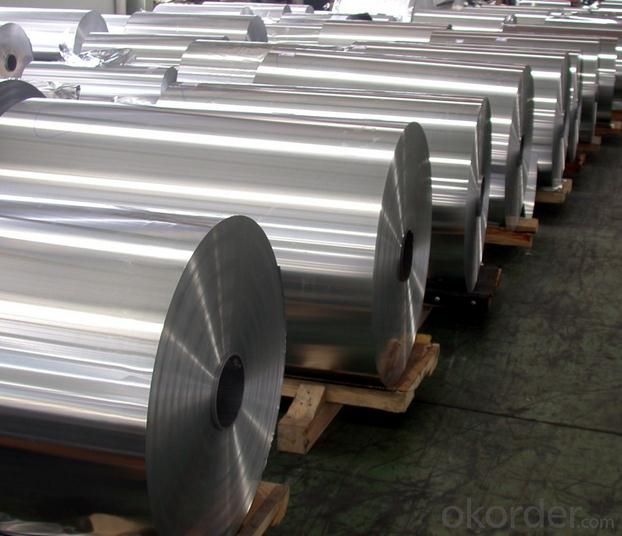
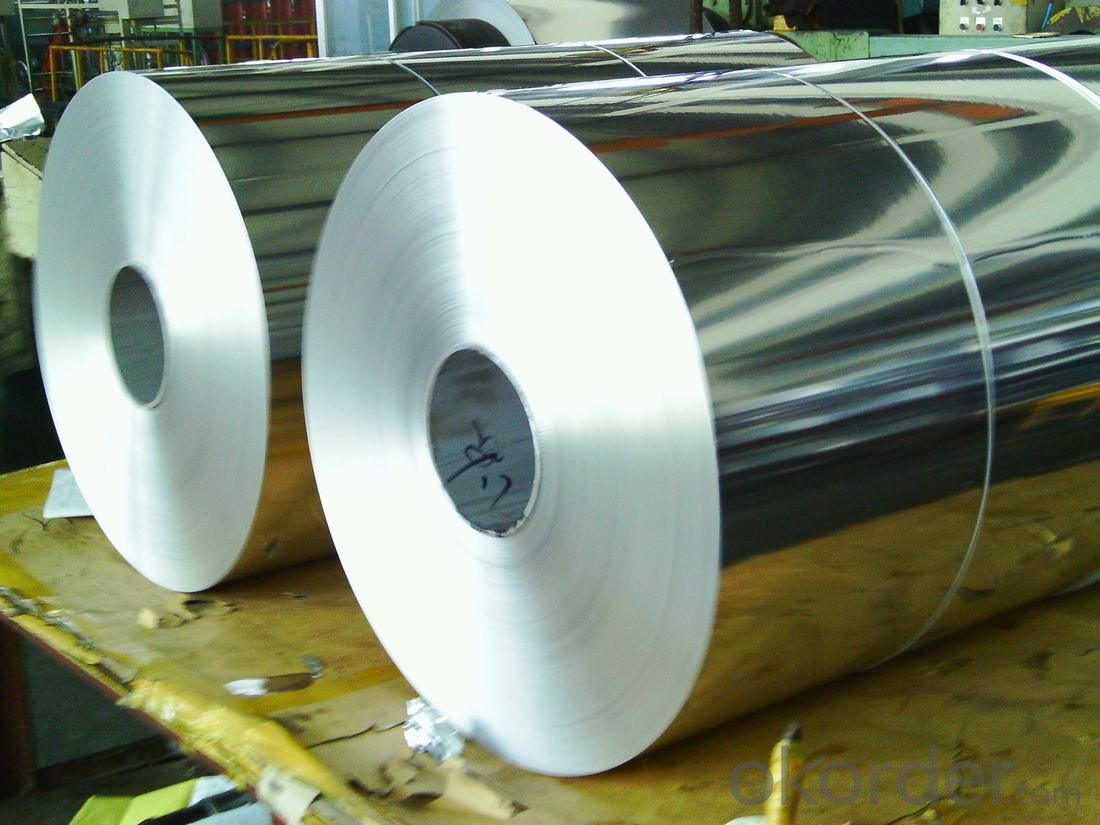
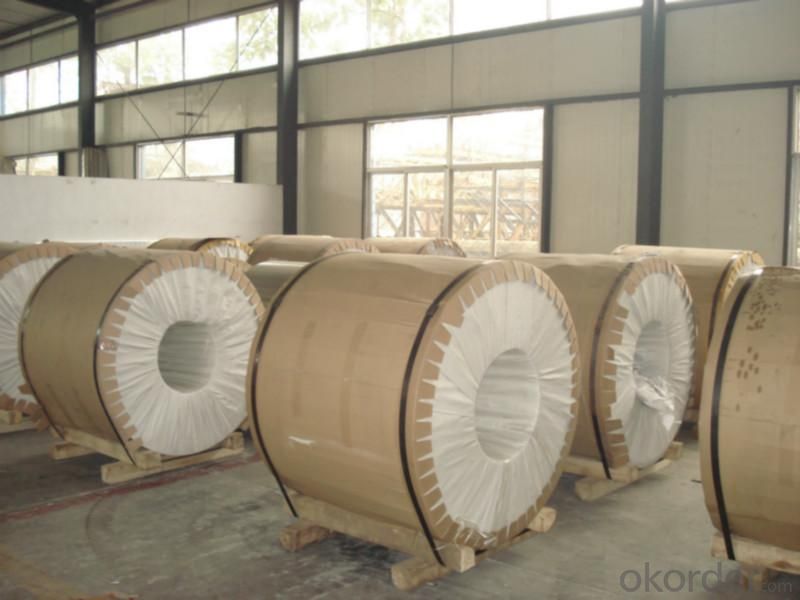
- Q: Is it okay to combine copper with aluminum in case of minting or coin making? Thanks :)
- Well, there are aluminum alloys that have copper in them (although they usually have other metals also), so I don't think it would be a problem. If you're thinking of copper plated aluminum, there is the potential for a galvanic reaction (meaning like a battery cell) that could cause the coin to corrode and fall apart. It's the same problem with the current production of US cents (which are copper coated zinc).
- Q: This question asks for methods to check the quality of aluminum coils.
- <p>To inspect aluminum coils for quality, follow these steps: Visually inspect for any surface defects like scratches, dents, or discoloration. Measure the thickness and width to ensure they meet specifications. Check the hardness and tensile strength using appropriate testing equipment. Examine the coil's flatness and straightness to avoid issues in further processing. Assess the surface roughness and cleanliness, as these can affect the coil's performance. Conduct a chemical composition analysis to confirm the alloy type and purity. Perform a magnetic particle inspection or ultrasonic testing to detect any internal defects. Finally, ensure the coil meets the required mechanical properties and specifications as per industry standards.</p>
- Q: How do aluminum coils contribute to the durability of roofs and facades?
- Aluminum coils contribute to the durability of roofs and facades due to their inherent properties. Aluminum is a strong and corrosion-resistant material, making it highly resistant to weathering, rust, and decay. This resistance to corrosion helps prevent the formation of leaks and structural damage, increasing the lifespan of roofs and facades. Additionally, aluminum coils are lightweight yet sturdy, providing structural integrity without adding excessive weight to the building. This feature reduces stress on the overall structure and ensures better performance against various environmental factors, including wind, snow, and seismic activities. Overall, aluminum coils play a vital role in enhancing the durability and longevity of roofs and facades.
- Q: What are the rules and guidelines that govern the transport of aluminum coils?
- <p>Yes, there are specific regulations for the transportation of aluminum coils. These include adhering to weight limits, ensuring proper packaging to prevent damage, and following guidelines for secure loading and unloading. Compliance with hazardous materials regulations is also crucial if the coils are being transported internationally. It's important to check with the specific transportation authority or consult the International Air Transport Association (IATA) and International Maritime Dangerous Goods (IMDG) codes for detailed guidelines.</p>
- Q: Describe the manufacturing steps involved in producing aluminum coils.
- <p>The production processes of aluminum coils involve several key steps. Initially, aluminum ingots are melted in a furnace. The molten aluminum is then transferred to a casting machine where it is cast into a continuous strip. This strip is cooled and passed through a series of rollers to reduce its thickness and achieve the desired coil gauge. The rolling process can be hot or cold, depending on the final product's properties. After rolling, the aluminum coil may undergo annealing to improve its ductility and strength. It is then cleaned, oiled, and wound into coils. Quality control checks are performed throughout the process to ensure the coils meet specific standards. Finally, the aluminum coils are packaged and shipped for various applications such as construction, automotive, and packaging industries.</p>
- Q: How are aluminum coils manufactured?
- Aluminum coils are typically manufactured through a process called continuous casting and cold rolling. In this process, molten aluminum is poured into a mold to form a solid slab. The slab is then passed through a series of rolling mills to reduce its thickness and achieve the desired gauge. This rolling process is repeated several times until the desired thickness and surface finish are achieved. The coils are then cooled, trimmed, and packaged for distribution.
- Q: What are the different alloys used in aluminum coils?
- There are several different alloys commonly used in aluminum coils, each with its own unique properties and applications. Some of the most frequently used alloys include: 1. 3003: This alloy is known for its excellent formability and corrosion resistance. It is often used in applications that require moderate strength, such as automotive parts, storage tanks, and kitchen utensils. 2. 5052: This alloy is highly versatile and offers good corrosion resistance, high fatigue strength, and excellent weldability. It is commonly used in the manufacturing of aircraft fuel tanks, marine components, and architectural applications. 3. 6061: Known for its high strength and excellent machinability, 6061 is often used in structural components, such as frames and braces. It also offers good corrosion resistance and is commonly used in the aerospace and automotive industries. 4. 8011: This alloy is primarily used in the packaging industry, especially for making aluminum foil. It offers good formability, high tensile strength, and excellent resistance to moisture and chemicals. 5. 1100: This is a commercially pure aluminum alloy, known for its high electrical conductivity and good thermal conductivity. It is commonly used in electrical wiring, heat exchangers, and lighting fixtures. These are just a few examples of the alloys used in aluminum coils, and there are many other variations available to suit specific needs and applications. The choice of alloy depends on factors such as desired strength, corrosion resistance, formability, and cost considerations.
- Q: My boyfriend sweats a lot and uses Mitchlum deodorant, a lot of it, under his armpits and waits til it dries to stop the sweating. I heard aluminium was bad for you, but he says natural deodorants don't work as well. What do you think?
- different styles and types of deodarants work on different people experiment on lots of deodarant and see which one where u can not use to much but is still petty effective
- Q: When they say to coat entire roof system with Aluminum coating, what does that mean? The area to coat is NOT the ceramic barrel tiles of a roof but the flat section covered with tar paper and granules of shiny sand. Is it a liquid? Clear? Good for the roof.? How is it applied?
- Why you would be coating a flat roof with Aluminum coating is beyond anything I have learned. Flat roofs should have a felt and tar coating to water proof them. Aluminum roof coating is used mostly on mobile homes to reflect heat because mobile homes don't have attics to trap the heat and carry it to vents. It also seals the water out at the metal seams. Aluminum coating is a type of polymer that has aluminum flakes in it. It is brushed on like a thick coat of paint and allowed to dry.
- Q: What is the purpose of an aluminum coil and what are its applications?
- <p>An aluminum coil is a versatile material that serves various functions. It is used in numerous applications due to its lightweight, corrosion resistance, and high thermal and electrical conductivity. Common uses include manufacturing heat exchangers, transformers, and electrical wiring. Aluminum coils are also utilized in the construction of automotive parts, aerospace components, and in the packaging industry for cans and foils. Additionally, they are employed in the HVAC industry for air conditioning and heating systems, and in the production of various consumer goods.</p>
Send your message to us
ASTM Grade 1100 Aluminum Strips Belt for Solar - Aluminum Coils Prices
- Loading Port:
- Shanghai
- Payment Terms:
- TT OR LC
- Min Order Qty:
- 5 m.t.
- Supply Capability:
- 500 m.t./month
OKorder Service Pledge
OKorder Financial Service
Similar products
Hot products
Hot Searches
Related keywords
